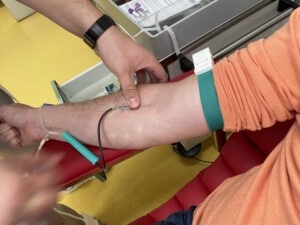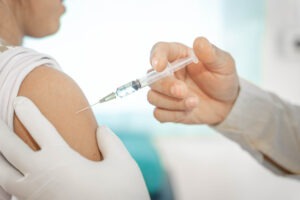Pregnancy: A Healthy Start

Pregnancy is a great time to embrace earth-friendly behavior. Choose nontoxic household cleaners, paints, and pesticides to limit unneeded chemical exposure. Many nontoxic products are plant-based or labeled as safe for household use. Findings from animal studies suggest pesticide exposure at high levels may contribute to miscarriages and low birth weight. Consider buying organic for leafy greens and thin-skinned fruits like peaches and strawberries. Some cosmetics contain harmful substances; ask your doctor for alternatives.
Create a Nontoxic Nursery
Furniture, paint, and carpeting can all contain volatile organic compounds (VOCs). VOCs are chemicals that at high levels can cause headaches, nausea, and even organ damage with long-term exposure. VOC levels indoors are on average two to five times higher than outdoors. To limit VOCs in the nursery, look for furniture made of solid wood with a low-emitting finish. Use paints labeled low- or no-VOC. Increase ventilation and keep the temperature and humidity low but comfortable. Warmer, more humid environments promote the release of more VOCs.
Disposable vs. Cloth Diapers
Disposable diapers clog up landfills. But cloth diapers require repeated washings, which use lots of water and energy. Consider using a high-efficiency washing machine to save water and energy. Disposables are more convenient for many parents. Some varieties are made without bleach, while others are flushable or compostable. Baby washcloths can substitute for disposable baby wipes.
Breastfeeding vs. Bottle Feeding
Breastfeeding uses no packaging, creates no waste, and needs no preparation. It’s an environmentally friendly option for feeding a baby. Since some substances can be passed through breast milk, limit your exposure to chemicals such as lead, mercury, and cigarette smoke. Some women should not breastfeed due to a medical condition or the use of certain medications. If you’re unsure about whether or not you should breastfeed, discuss your medical history with your doctor before your baby arrives,
Solid Foods for Baby and Beyond
Making baby food is as easy as pureeing or mashing fruits and vegetables. Homemade food makes it easy to avoid excess salt, sugar, and preservatives. Children may be especially sensitive to pesticides. Some foods, including kid favorites like apples, peaches, and pears, tend to have more pesticide residue. Consider buying organic versions of those foods. As kids grow older, continue to emphasize whole foods over processed
Conserve at Bath Time
Save water and energy by bathing babies just a few times a week. Bathing too often and using scented products can be drying to the skin. PVC shower curtains often contain VOCs, so look for ones made of fabric. Many plastics, shampoos, lotions, and powders — even those made for babies — contain phthalates, chemicals linked to a range of health problems. Choose products without phthalates or added fragrances.
Reduce, Reuse, Recycle
Ask other parents what gear you really need and what you can do without. Consider secondhand books and clothes, especially those you won’t use for very long. (Avoid used breast pumps, which may have been contaminated, and used car seats, which may not meet current safety standards or may have been compromised in an accident. Before you choose a crib, contact the manufacturer for recalls and safety information.) Give away outgrown toys and clothes.
Green Cleaning
Household cleaning products can contain harsh chemicals that are dangerous to young children. Use non-toxic cleaners or homemade solutions that include vinegar, baking soda, or lemon juice. Kids create a lot of laundry, so choose gentle detergents that are easy on tender skin as well as the environment.
Choose Plastics Carefully
A lot of debate surrounds the safety of some plastic toys. The chemicals in them and some plastic containers could be harmful. It’s hard to tell which plastics contain BPA. Choose safer ones stamped with the numbers 1, 2, 4, or 5, and avoid those marked 3, 6, or 7. Don’t microwave any plastics (including plastic wrap). Consider using glass baby bottles and food storage containers. Cloth toys or wooden blocks for infants may be good alternatives to plastic toys
Set a Good Example
Children are like sponges, absorbing everything they see and hear. Show them how to take care of the environment by conserving resources. Turn off lights, reduce mileage, and avoid wasting food. Build respect for the outdoors through hikes in the woods and playtime at the park. If you create a sense of wonder about the natural world, your children will grow up understanding the importance of taking care of it.





















